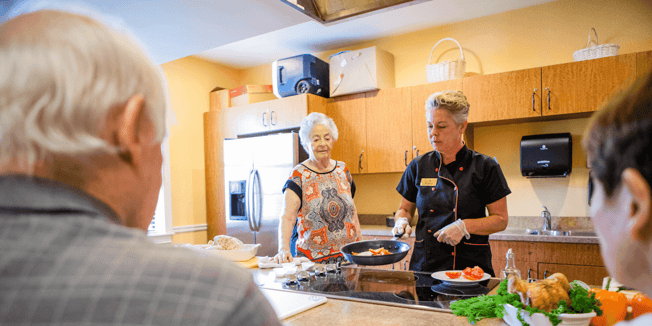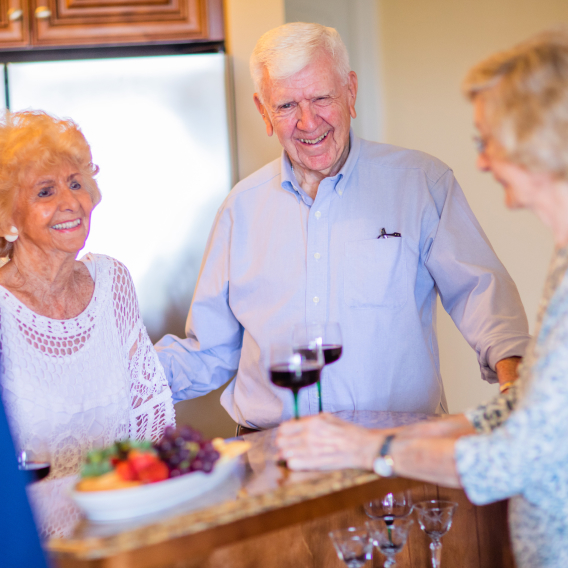Recognizing When Your Elderly Parent Needs Company: Action Steps

Have you been worried about whether your aging parent is really doing okay living at home alone? You might be concerned if they are safe, healthy, and thriving when you aren’t around giving a little extra help.
It is common for most adult children to wonder if their loved one is eating and sleeping well at home, and whether they’re taking their medications as prescribed. But it can be difficult to know when to start asking questions or investigating further without causing trouble. Fortunately, you can keep your eyes peeled for certain signs that could be a red flag and point to a potential issue.
We’ve compiled a few common signs that could mean a conversation with your loved one or their physician is in order.
1. Falling at Home or While Out and About
According to the Centers for Disease Control and Prevention, one in every four American seniors fall every year. This means that there are nearly 14 million falls annually, and although not all of those result in serious injury, about five million require some type of medical intervention.
That number might seem high, but many professionals estimate that the real number of senior falls is actually even higher. Some seniors who fall may not report it to their physician or loved ones because of feelings of embarrassment.
If your loved one has fallen in the past six months, it’s time to begin researching options to ensure they have the support they need in emergency situations. If you are wondering if your loved one is falling but not reporting it, you can look for small signs of injury such as scrapes, bruises, or grimacing while getting up or down from a chair.
2. Poor Nutrition
We’ve all heard the saying “you are what you eat,” because healthy food makes a healthy body. Eating healthy foods consistently throughout the day keeps our immune system working, helps with muscle recovery, and makes sure our bodily systems are functioning properly.
Healthy nutrition is even more important as we age. However, many older adults living at home struggle with healthy eating. It’s no wonder: Planning and preparing meals three times during the day with fresh and healthy ingredients is difficult, not to mention getting to and from the grocery store regularly to keep the kitchen stocked with good food.
Take a look at your loved one’s kitchen, and look for warning signs that their nutritional needs aren’t being met. Are they relying on processed foods or takeout for more than one meal per day? Are there fresh foods in the refrigerator or is it nearly empty every time you visit? You can also take a look at your loved one’s weight. Any recent weight loss or weight gain could indicate they are not thriving at home and need some additional support.
3. Feelings of Loneliness
Recent research about seniors and isolation has led to some startling conclusions about how loneliness negatively affects overall health and wellness. The Centers for Disease Control and Prevention reports connections between feelings of loneliness and increased anxiety, depression, obesity, cognitive decline, and other health complications.
If your aging parent is living alone, they are already at an increased risk for isolation. If they no longer drive, have cognitive decline, or live with mobility challenges, their risk increases even more. For seniors living with a spouse or partner, there are still serious risks for isolation and loneliness.
Ask your loved one about their week to discover if they are speaking with friends or family at least a few times per day. Inquire about their feelings and whether they feel lonely during the day. If your loved one is feeling lonely most of the time, it’s a sign for you to begin helping fill their social calendar or searching for a new way to give them the social support they need to stay healthy.
Is it time to get help for you or your loved one? Take our 4-minute assessment to get more detail on the right direction for you.
Take the Assessment4. Medication Mistakes
Many older adults take more than one medication per day, and keeping up with complex medication schedules can cause serious issues. According to the Patient Safety Network, seniors are at a heightened risk for adverse drug events, which means they are more likely to be harmed from medication errors.
If your loved one is taking more than one prescribed medication or vitamin per day, they are automatically at a higher risk for medication errors. Be sure to observe their weekly pill boxes during your visits, and take note if any pills are leftover or out of place. If you help out by picking up their medications at the pharmacy, talk with the pharmacist about any concerns you might have about drug interactions or side effects, especially for new prescriptions.
Help Your Senior Parent Thrive
Your loved one might be living at home without any major incidents, but they may not be thriving. The right support system and resources can help them meet their wellness goals so that they feel their best, as well as help to prevent serious health consequences that can arise from falls, poor nutrition, decreased social opportunities, and medication management errors.
One solution is a senior living community. These communities are certainly not your grandmother’s nursing homes. Instead, they are vibrant communities full of neighbors who become friends, with team members who are there to provide exceptional service and facilitate new personal and social opportunities.
A Senior Living Community to Meet Any Need
Senior living communities come in all shapes and sizes. There are many options that could suit your loved one’s preferences and budget. Senior living communities offer amenities and services designed to support older adults with various challenges and preferences.
Independent living communities feature maintenance-free living and robust social opportunities and events for residents to enjoy. They’re ideal for the older adult who wants more freedom to pursue the things they love in retirement.
Assisted living communities offer amenities and services similar to independent living communities, with the addition of around-the-clock assistance from caregivers. Residents enjoy personalized help with activities of daily living and medication management, as well as chef-styled meals three times per day and a vibrant social event calendar.
Memory care communities are specially designed for those living with Alzheimer’s disease or another type of dementia. Team members are trained in best practices of dementia care, and residents enjoy an environment tailored to their interests and preferences.
Finally, skilled nursing facilities offer around-the-clock skilled nursing care for residents living with complex medical conditions, dealing with chronic pain, or recovering after a hospital stay, surgery, or procedure.
Real Solutions for Seniors and Their Families
Senior living communities offer more than just a helping hand or friendly neighbors. They also offer real solutions to common challenges that can occur for older adults living at home alone or with a partner.
If you’re preparing to have "the conversation" with your parent or loved one, download our guide, Having the Conversation: TALKING TO A PARENT ABOUT SENIOR LIVING for help on how to approach the sensitive and emotional topic.
This post was originally published in July 2021. Revised September 2023.







.png?width=307&height=200&name=Blog%20%2333%201400%20x%20700%20(1).png)

.png?width=307&height=200&name=Blog%20%2332%201400%20x%20700%20(8).png)



